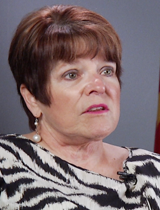State Sen. Kimberly Yee, R-Phoenix.
Arizona public schools are getting a better deal from the state Legislature than they have in years, but funding levels are still far off of what they had before the recession.
Legislators who focus on education funding and policy said in interviews for Friday's Arizona Week broadcast that the newly enacted state budget is an improvement.
"What we did pass ... was very good for education, and what we had was an increase in the baseline funding for our K-12 education to over $80 million," said state Sen. Kimberly Yee, R-Phoenix, chair of the Senate Education Committee.
 State Sen. Linda Lopez, assistant minority leader, D-Tucson.
State Sen. Linda Lopez, assistant minority leader, D-Tucson.
The increase in base-level funding for the 2013-14 fiscal year is $82 million, to be exact, according to the Joint Legislative Budget Committee's analysis following Thursday's budget passage. The analysis said that allows $58.82 more per student, or 1.8 percent, from the current funding level.
While it is better, it is not nearly enough, said Sen. Linda Lopez, D-Tucson, the Senate assistant minority leader.
"I think districts are talking now that they might be able to give some raises to teachers," Lopez said. "But it certainly doesn't make up for the over $2 billion in cuts that K-12 education has experienced over the past few years."
K-12 base-level budget cuts in the last five years actually totaled $1.2 billion, according to state data, with additional cuts in capital funding, including a freeze on all funding for school construction and maintenance.
The 2013-14 budget will include K-12 funding to get Gov. Jan Brewer's performance-based funding program under way, although not at the $54 million level she requested. The budget includes $2.4 million.
Yee said that is a way to get it started, while Lopez said she was worried that performance-based funding will leave behind schools that are in economically disadvantaged areas, one of the markers of under-performing schools.
"There was a reason it didn't get a lot of funding," Lopez said. " ... We have looked at the models that have been created by a finance guru in education ... and he has said this will really hurt our low-income districts, our districts that have high minority populations. This will really penalize them."
Capital funding for schools got more money this year than in recent years - $14 million for building maintenance and repairs. The new school construction fund was budgeted $700,000. At the same time, the Legislature did not act on a bill that would have raised the borrowing ceiling for school districts.
"It's certainly not enough to meet the needs of the schools," Lopez said. "Again, it's a like a little drop in the bucket, but doesn't get schools what they need."
Other educational funding in the 2013-14 state budget includes:
-
$5.4 million for a new state database to allow proper tracking of school performance measures. It is part of the reforms that Brewer and Superintendent of Public Instruction John Huppenthal have called for, with Huppenthal saying more than $20 million is needed for the system.
-
A $4.5 million increase for adult education and General Educational Development, or GED, programs.
-
$1.2 million more for Joint Technical Education Districts. Statewide, JTED funding was cut by millions two years ago, eliminating all career and technical training for ninth graders.
-
$3.6 million for school safety, one-fourth of which must go for safety equipment.
-
$2.0 million for rural community college capital outlays.
-
$15.3 million to give Arizona State University and Northern Arizona University per-student funding levels equal to those at the University of Arizona. Historically, the UA has had higher per-student funding levels from its status as the first and only state university for more than a half-century.
-
$8.0 million more for the UA College of Medicine's Phoenix campus.
-
$5.0 million toward the universities' performance-based funding plan, which is advancing as policy by the state Board of Regents.

By submitting your comments, you hereby give AZPM the right to post your comments and potentially use them in any other form of media operated by this institution.